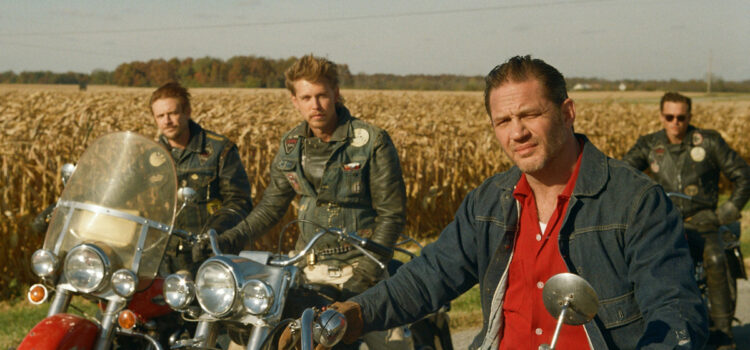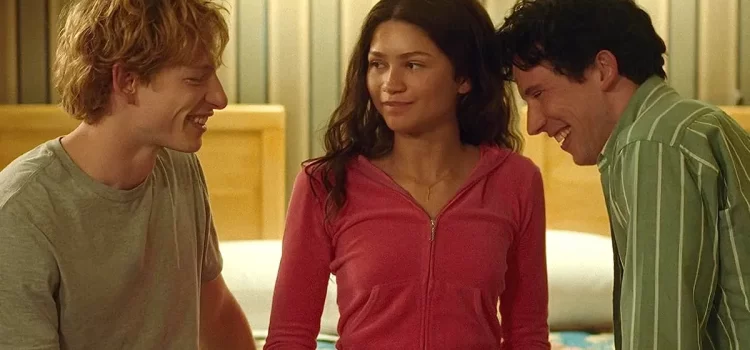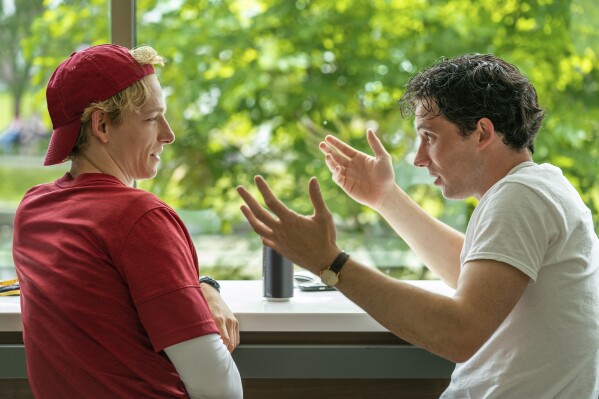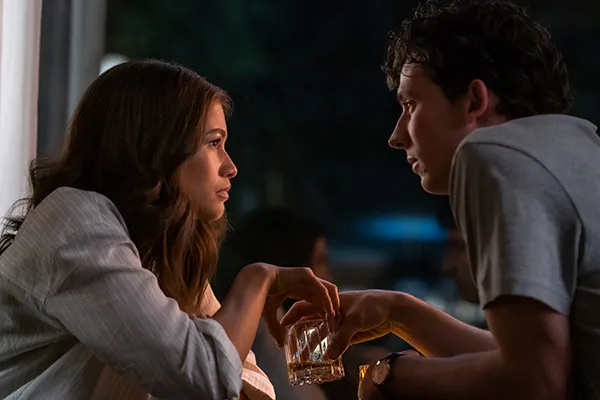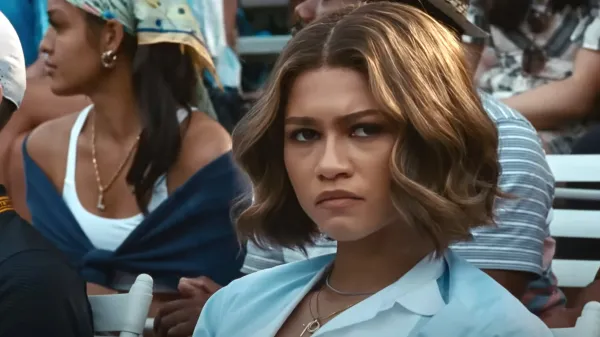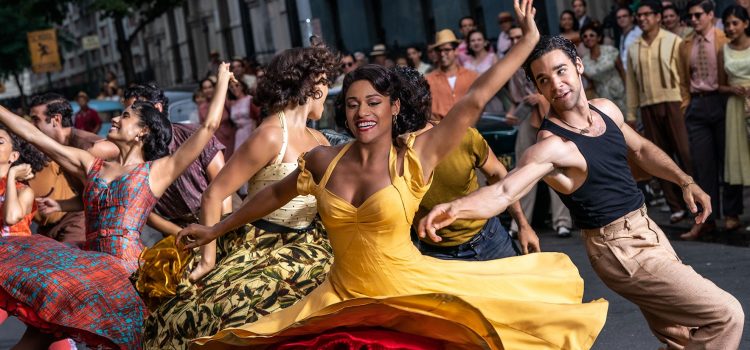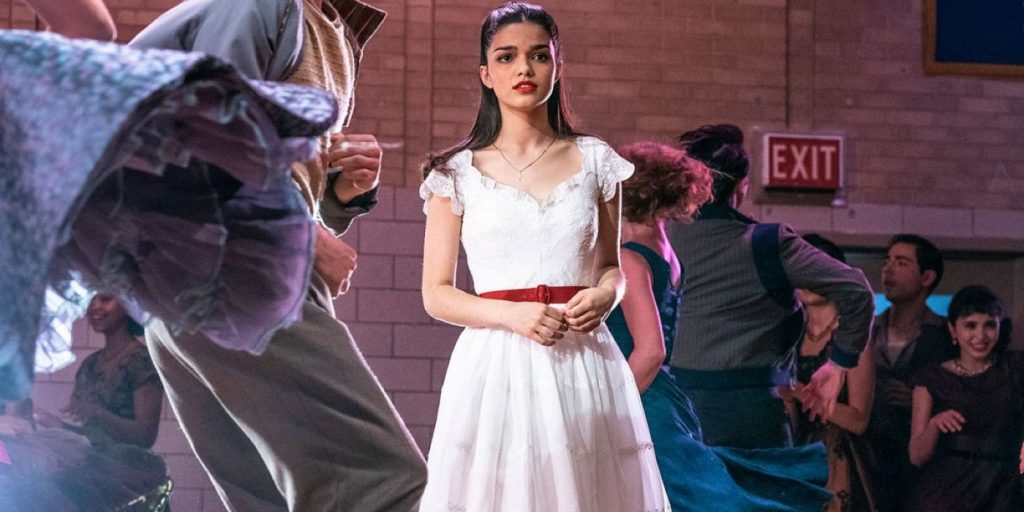By Alex McPherson
Richly atmospheric and suspenseful, yet frustratingly conventional, director Jeff Nichols’ “The Bikeriders” can’t quite connect its engaging performances and visceral thrills with a story that’s on the same level.
Nichols’ film is inspired by a book of the same name by acclaimed photographer Danny Lyon (a version of him is played here by Mike Faist). It begins in the mid-1960s and charts the story of the Vandals, a fictionalized Chicago motorcycle club of ragtag, chopper-loving misfits.
They come together to drink, fight, and assert dominance over their territory, like an idiosyncratic family that’s alternately affectionate and combative. As they ride down the open road, engines blasting in their ears, they’re in their own powerful element.
Led by the brooding and volatile Johnny (Tom Hardy), a truck driver and family man who was inspired to form the group after seeing Marlon Brando in “The Wild One,” the Vandals aren’t an outright “gang,” although threats of violence are ever-present if anyone’s ego is threatened.
Rather, they’re like-minded souls looking for a sense of community and freedom from what mainstream society expects of them. They’re just willing to engage in the occasional beat down and destruction of property if the mood or situation calls for it.
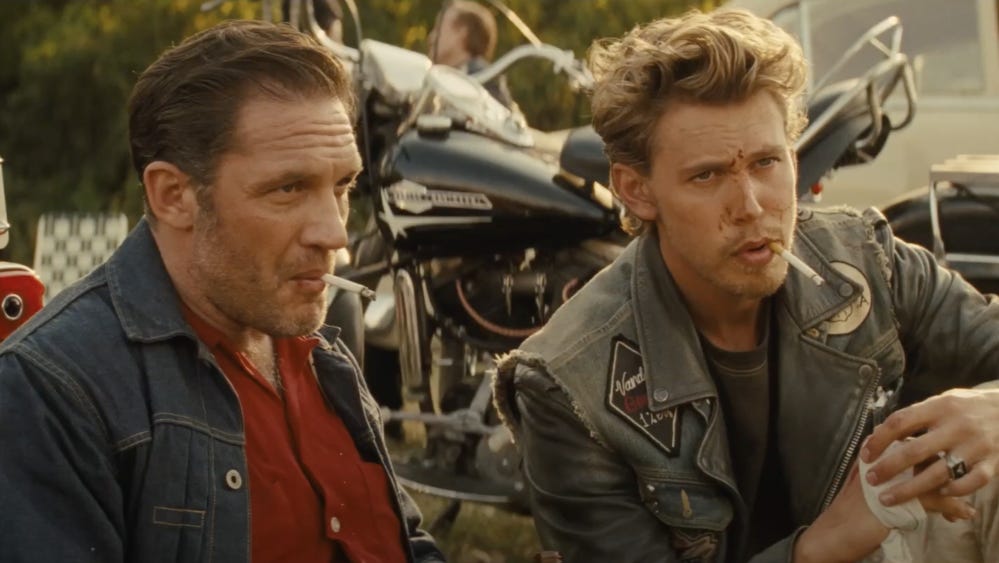
Their makeshift brotherhood simultaneously satiates a need for togetherness and an outlet to embrace their (often misguided) sense of “manliness.” The rough-and-tumble crowd includes, among others, a mechanic named Cal (Boyd Holbrook), a perpetually drunk outcast named Zipco (Michael Shannon), and a man named Cockroach (Emory Cohen) who prides himself on eating bugs.
There’s also the tatted-up, enigmatic, and stereotypically handsome chap named Benny (Austin Butler), who mild-mannered Cathy (Jodie Comer) – the film’s narrator – falls for after stumbling into him and the Vandals at a local bar and marries soon after.
“The Bikeriders” largely unfolds through photographer Danny’s interviews with Cathy and various members of the Vandals. Cathy, with a sarcastic, amused, but exasperated attitude, brings us into the Vandals’ orbit as an outsider.
Through flashbacks, she takes us through her experiences from her initial lusty courtship with Benny, to the group’s evolution and de-evolution over time, as a new generation — partly symbolized by The Kid (a frighteningly effective Toby Wallace) — threatens Johnny’s reign and risks transforming the Vandals into a different beast altogether.
Cathy also battles with Johnny over Benny’s soul, as Benny (a wildcard prone to impulsive behaviors) is forced to choose between his life as a Vandal and his future with Cathy. All the while, Nichols presents a nostalgic vision of the past, attempting to help us empathize with a troubled but misunderstood group on the margins of American society.
Indeed, “The Bikeriders” tries to tackle quite a bit during its 116 minute runtime — perhaps too much for its own good. For all the immaculate scene-setting, compelling performances, and armrest-gripping moments of suspense, Nichols’ film is ultimately a surface-level portrait of its subjects.
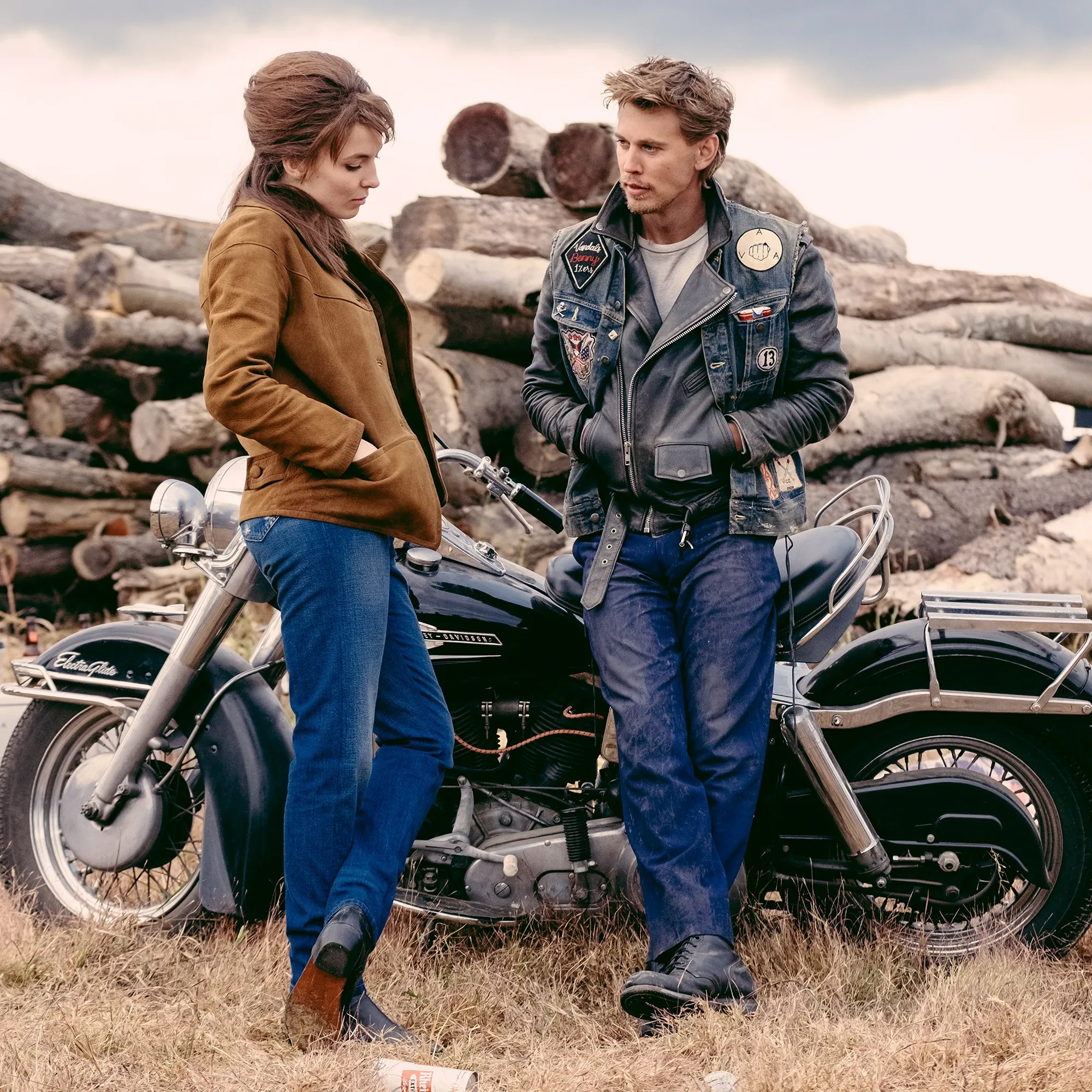
Despite this, however, the film is consistently entertaining, coasting on the strength of its performances and “Goodfellas”-lite conceit to deliver scenes of smoke-filled machismo, camaraderie, and wry humor mixed with bursts of startlingly graphic violence that keeps us on our toes moment-to-moment.
Julie Monroe’s editing is alternately breezy and jagged, reflecting the film’s juxtaposition of fantasy and reality, confidence and vulnerability — letting us sit in on exchanges that could go from peaceful to shocking at any given moment.
These scenes are counterbalanced by Kathy’s narration that finds absurdity, childishness, as well as poignancy in the Vandals’ efforts to maintain a semblance of control over not only their territory but their individual lives.
Nichols clearly has a reverence for the Vandals, but he’s careful to not overly romanticize them; their fierce dedication builds a group identity that’s both freeing and limiting, should they ever decide to leave.
The actors, across the board, take big swings that almost always pay off, barring some questionable accents that veer into cartoonish from time to time. Comer definitely goes for it, and while her performance will likely prove divisive, her delivery and narration is a good fit for Nichols’ screenplay, which buoys its darker edges with sarcastic humor that effectively takes the Vandals down to size. Cathy, naive though she sometimes is, takes no bullshit, and is willing to stand up to Johnny to fight for Benny’s safety.
Butler provides the bulk of the film’s eye-candy as Benny, portraying the film’s mysterious rebel-without-a-cause. We don’t learn much about Benny or his past, but he’s clearly damaged, looking for a way to express himself and make his mark on the world, a troublemaker with a thirst for danger whose worldview is slowly shifting with the introduction of Cathy into his life.
Benny is pulled back and forth between fantasy and reality, danger vs. safety, the thrill of the unknown vs. the security of Cathy. Butler suitably commands attention even with his limited dialogue, brimming with pure, unadulterated star power that Nichols happily emphasizes, particularly in his sizzling first scenes with Comer.
Johnny, with a nasally drawl and intimidating physique that Hardy expertly embodies, lashes out against any threat to his power, partly because he knows the Vandals cannot last without his guidance, and that his reign is nearing its end. There’s much pathos to be found here, brought to life by Hardy, as Johnny fights (scarily, in some cases) to hold onto the group as it threatens to slip through his fingers.
Hardy gives the film’s standout performance, lending Johnny a melancholy beneath his tough exterior and communicating his inner turmoil in a much subtler fashion than the screenplay permits the rest of the characters.
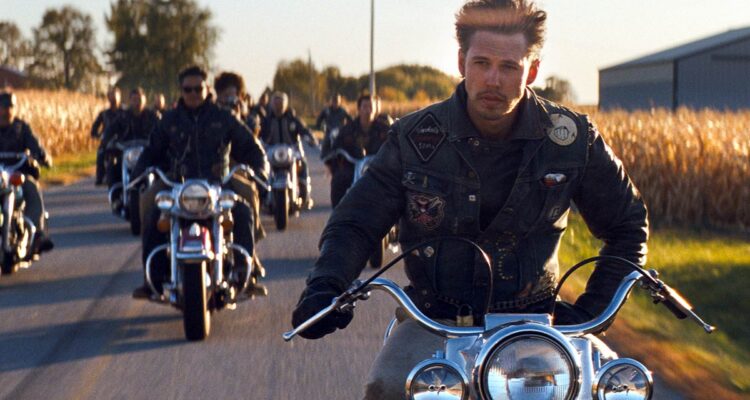
Through Johnny’s arc, “The Bikeriders” reveals itself to be a meditation on masculinity, on the affectionate yet unsustainable bonds that hold these men together as they attempt to outrun their problems on the open road, motorcycle engines blaring, even as reality and changing times are right on their heels.
With Nichols’ confident, classically-inspired direction in full swing — featuring freeze frames, time jumps, and tactile, lived-in cinematography by Adam Stone that admires the motorcyclists without shying away from their brutality — “The Bikeriders” is always engaging in-the-moment, but, when the sheen of star power wears off, the story’s ultimate simplicity is revealed.
It’s disappointing that, in the rearview mirror, so many side characters are reduced to archetypes that function more as ideas and symbols than tangible human beings. This is made more frustrating by a screenplay that lacks the depth necessary to explore their psyches and help us feel their motivations on a more memorable level.
It’s difficult, for example, to buy Kathy’s continued devotion to Benny. Framing the film through her perspective (at a remove) also misses an opportunity to explore the Vandals’ heights and struggles with more depth. The film claims to celebrate Lyon’s journalistic efforts (with a one-note performance from Faist that’s more irritating than involving) whilst cramming the diverse stories of its subjects into a neat, tidy, sub two-hour film for a mass audience.
Viewers well-versed in crime film tropes can predict beat-for-beat where the plot is headed, sending its individually compelling (but largely underdeveloped) characters down a formulaic road, as well as zeroing in on a relationship that’s difficult to become fully invested in. This is all at the expense of a more balanced portrait of characters worthy of closer looks that wouldn’t want to be pigeonholed into convention in the first place.
These issues hold “The Bikeriders” back from greatness, and make it somewhat superfluous in the crowd of films of its ilk that have come before. But there’s enough directorial craft and potentially awards-worthy acting on display that it’s still difficult to resist.
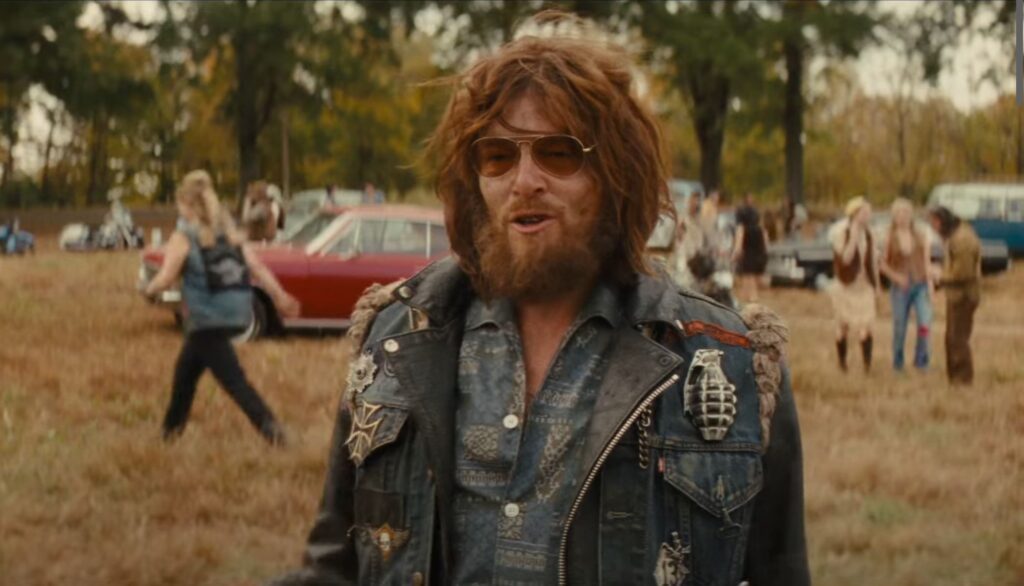
‘The Bikeriders’ is a 2023 crime drama directed by Jeff Nichols and starring Tom Hardy, Austin Butler, Jodie Comer and Michael Shannon. It is rated R for language throughout, violence, some drug use and brief sexuality, and the run time is 1 hour, 56 minutes. It opened in theatres June 21. Alex’s Grade: B.
Alex McPherson is an unabashed pop culture nerd and a member of the St. Louis Film Critics Association.

